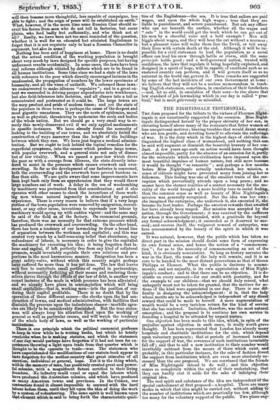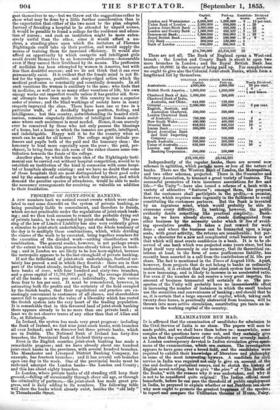THE NIGHTINGALE TESTIMONIAL. .
THE form proposed for the tribute to the virtues of Florence Night- ingale is not unnaturally suggested by the occasion. Miss N ight- ingale distinguished herself by the proper chivalry of her sex, in elevating herself above many of the restraints that fetter women of , leas unequivocal motives; braving troubles that would daunt many, who are less gentle, and devoting herself to alleviate the sufferings of war. It is the duty which in the highest days of chivalry dis- tinguished the highest class of womanhood, and nothing that can, be said will augment or diminish the beautiful bravery of her con- duct. A. few years ago such an action would have been thought almost impossible, partly for the absence of an occasion for it, partly for the restraints which over-eivilization have imposed upon the most beautiful impulses of human nature, but still more because it would be thought "so romantio " ; and perhaps a few months before Miss Nightingale actually undertook her mission, a sense of ridicule might have prevented many from joining her as. followers. This feeling was one of. the smallest traits of the cor- ruption whioh proverbially attends upon a long peace; and no, sooner have the sterner realities of a contest necessary for the mo- rality of the world brought a more healthy tone to social feeling,, than the common sense as well as beauty of Miss Nightingale's mission was generally recognized. But the idea was her own she imagined the enterprise, she undertook it, she executed it, she became its best leader. Perhaps the sweetest rewards that-awaited her have already been reaped. Her mission was accepted by the nation, through the Government; it was received by the sufferers for whom it was specially intended, with a gratitude far beyond any formal acknowledgment; it succeeded as it deserved to suc- ceed; and success itself, the vulgarest reward of enterprise, was here consummated by the beauty of the spirit in which it was earned.
It was natural, however, that the public which has taken no direct part in the mission should desire some form of expressing its own formal sense, and hence the notion of a "commemora- tion"; for as to the necessity of commemorating an act of the kind, it is obviously nonexistent. So long as history narrates the war in the East, the name of the lady will remain' and it is as sure to be handed to the most distant generations as that of Queen Philippa or Eleanor. What the public is 'desirous to comme- morate, and not unjustly, is its own appreciation of Miss Night- ingale's conduct ; and to that there can be no objection. It is de- sirable on every account—for our credit with posterity, and for the example 'to our children—that we should (July record, what unhappily must not be taken. for granted, that the motives for ac- tions of the kind were.appreoiated in our day. There is one dif- ficulty in designing the acknowledgment it is, that the lady whose merits are to be acknowledged is independent -of any direct reward that could be made to herself. I mere augmentation of wealth would be a very tasteless return for the kind of service that -she- has rendered. Imitation, therefore, was the most natural conception • i' and the proposal is to continue her own service in founding ahospital to be attended by unpaid-nurses. One objection has been made to this idea, which, in spite of the prejudice against objection in such oases is 'really worth grave thought. It has been represented that London has already many hospitals and charitable institutions for the sick, which depend upon voluntary payments ; that at periods of increased taxation for the support of war, the revenues of such institutions invariably fall off; and that to add a new institution to their number would inevitably subtract from the means of those which exist, and probably, in this -particular instance, for the sake of fashion divert the support from institutions which are even more absolutely ne- cessary than the one proposed. We are convinced that the friends of Miss Nightingale intend to do well ; and this objection comes so -completely within the spirit of their undertaking, that they, can hardly cast it aside for the sake of indulging their original idea. The real spirit and substance of the idea are independentn, the special embodiment at first proposed—a hospital. There are meny modes in which that idea might be carried out, without adept to' the number of institutions which. are practically too feW, although' too many for the voluntary support of the public. Two planrsee gest themselves to us,-but we throw out the suggestions rather to show what may be done by a little further consideration than in the expectation that either of the two must be the plan adopted. Instead of founding a hospital to be attended by unpaid nurses, it would be possible to found a college for the residence and educa- tion of nurses ; and such an institution might be more exten- sively useful than the other, since it would afford a nu- cleus, a standing-place upon which the imitators of Florence Nightingale could take up their position, and would supply the means of training them for increased efficiency. It would also afford an opportunity by which energetic and ]ntelligent girls could devote themselves to an honourable profession-honourable even if they earned their livelihood by its means. The profession of medicine has been attempted by women in America, but with less than doubtful success; and we do not think that it can ever permanently exist. It is evident that the female mind is not fit- ted for the vigorous, positive, and sharp-edged action which the medical profession so constantly and essentially demands. In all such vocations the woman is ancillary to the man ; who finds that in medicine, as well as in so many other vocations of life, his own energy works out imperfect results unless it has gentler aid. Seve- ral attempts have been made in this country to rear a superior order of nurses; and the blind workings of society have in many respects impreved the class. There have been one or two in a particular walk, of a decidedly higher position, feeling, and intelligence ; but this country, notwithstanding its boasted civil- ization, remains singularly destitute of intelligent female assist- ance where such assistance is most needed. Hence, it can scarcely ever be conceived by those who not only possess the blessings of a home, but a home in which the inmates are gentle, intelligent, and indefatigable. Happy will it be for the country when so much can be said for all homes ! The college might include pro- fessors and pupils both of the paid and the honorary class : the honorary to tend more especially upon the poor ; the paid, per- chance, to bring from the sick room of the richer classes some con- tribution towards the funds of the college.
Another plan, by which the main idea of the Nightingale testi- monial can be carried out without hospital competition, would be to establish an institution of the kind in connexion with some hospi- tal or hospitals already existing: and we have no doubt that some of those hospitals that are most distinguished by their good order and by the amount of suffering to which they minister, and which demand the peculiar species of attendance, would be able to make the necessary arrangements for receiving so valuable an addition to their foundation.



























 Previous page
Previous page